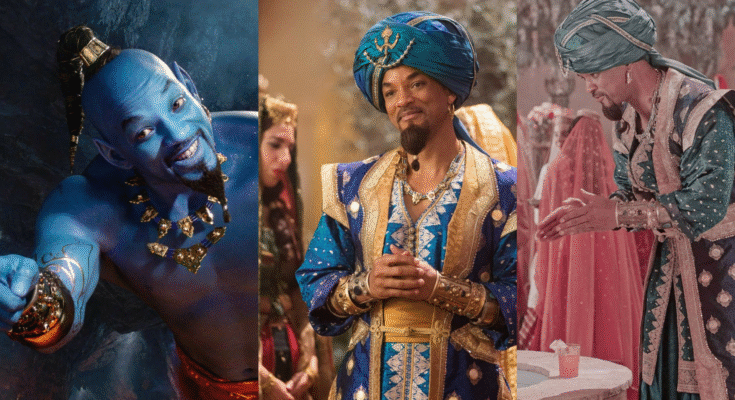The Man Who Mastered Everything
Willard Carroll Smith II (born September 25, 1968, in Philadelphia, Pennsylvania) represents one of cinema’s most remarkable success stories. Few entertainers have achieved what Will Smith has accomplished across multiple disciplines—he is simultaneously a Grammy Award-winning rapper, a Hollywood leading man commanding $20 million per film, and an Oscar-winning actor. In April 2007, Newsweek called him “the most powerful actor in Hollywood.” To understand Will Smith is to understand the ultimate entertainer—a man who refuses to be confined to a single genre, a single medium, or a single identity.
His journey from a middle-class kid in Philadelphia to a global cultural phenomenon demonstrates something crucial about American entertainment: that charisma, intelligence, work ethic, and an willingness to take risks can elevate an entertainer to heights once thought impossible. Will Smith didn’t just succeed in one field—he mastered multiple fields simultaneously, proving that the boundaries between music, television, and film are not walls but mere suggestions.
The Philadelphia Story: Unlikely Beginnings
Willard Christopher Smith Junior was born on September 25, 1968, in Philadelphia, Pennsylvania, to Caroline and Willard Smith Senior. Though most people believe he grew up poor, as in The Fresh Prince of Bel-Air storyline, his family lived in middle-class West Philadelphia, and his father owned a refrigeration company. This detail is important because it reveals something about Smith’s creative genius—he understood that great comedy and entertainment often comes from imagination and relatability, not autobiographical accuracy.
Smith’s initial pathway wasn’t toward entertainment. He turned down admission to the prestigious Massachusetts Institute of Technology for engineering in order to pursue a music career. This decision—to reject MIT and choose art—demonstrates the conviction that has characterized his entire career. He was willing to bet on himself, to take risks, to choose passion over the safe path of guaranteed credentials.
But his entry into music wasn’t through some grand master plan. At age 16, he met Jeff Townes, a fellow rapper, and the two began to perform together almost by accident. Smith filled in as a hype man at one of Townes’ performances, and something clicked. A friendship formed. An artistic partnership was born. They would become one of hip-hop’s most important acts, though neither could have predicted it at the time.
The Fresh Prince Era: Redefining Hip-Hop
Smith began his career as a rapper at age 12 and quickly developed his own semi-comic style. This wasn’t accident—it was artistic choice. While other rappers were embracing hard-core lyrics and aggressive themes, Smith and Townes were crafting humorous, radio-friendly songs that told stories without profanity or violence.
The duo, known as DJ Jazzy Jeff & The Fresh Prince, became known for their fun, story-telling raps that didn’t use bad words. Their first single, “Girls Ain’t Nothing but Trouble,” was released in 1986 and became a hit. They produced several hits and eventually won two Grammy Awards for Best Rap Performance for “Parents Just Don’t Understand” (1988) and “Summertime” (1991).
This achievement cannot be overstated. DJ Jazzy Jeff & The Fresh Prince were the first rap act to win a Grammy Award, and the first to win an MTV Video Music Award for Best Rap Video. They established that hip-hop didn’t require violence, profanity, or hard-core street narratives to be authentic or commercially successful. They proved that intelligence, wit, humor, and storytelling were equally valid artistic approaches.
“Summertime” remains one of hip-hop’s greatest achievements—a song about summer in the city that captures nostalgia, youth, romance, and simple joy. The production is immaculate. The lyrics are poetic. Smith’s delivery is effortless. The song won a Grammy and peaked at number 4 on the Billboard Hot 100, proving that mainstream audiences would embrace thoughtful, artistic hip-hop.
XXL has referred to him as “one of the most important rappers of all time.” This assessment acknowledges that Smith didn’t just make successful rap music—he fundamentally altered what rap music could be.
The Financial Reckoning: Rock Bottom and Rebirth

However, success in the 1980s came with a price. Smith spent money freely around 1988 and 1989 and underpaid his income taxes. The Internal Revenue Service eventually assessed a $2.8 million tax debt against Smith, took many of his possessions, and garnished his income. By 1990, Smith was financially devastated—nearly bankrupt despite his success.
This moment—financial ruin resulting from success—could have ended Smith’s career. It nearly did. But instead, it became the catalyst for reinvention.
In 1990, the NBC television network signed Smith to a contract and built a sitcom around him. In collaboration with film producer Benny Medina, Smith and the network created The Fresh Prince of Bel-Air, loosely based on Smith’s real-life persona—a poor kid from Philadelphia going to live with rich relatives in California. The irony was delicious. Smith, bankrupt in real life, would now star in a show about a kid learning to navigate wealth.
The show was successful and began his acting career. Running for six successful seasons on NBC (1990-96), the series earned Smith two Golden Globe Award nominations. More importantly, it demonstrated that Smith possessed something rare—charisma that translated to television. He wasn’t just playing a character—he was playing a version of himself. And audiences loved him.
The Fresh Prince of Bel-Air became far more than a successful sitcom. It was a watershed moment for Hip-Hop and Black television. Some publications have referred to it as one of the “Greatest Sitcoms of All Time.” Professor Andrew Horton noted, “Smith’s genre of comedy, popularized on the sitcom Fresh Prince of Bel-Air translated well into commercial box-office appeal.” The show demonstrated that a hip-hop artist could transition successfully to acting, that African-American comedic talent could anchor a major network show, and that smart, character-driven comedy would resonate with mainstream audiences.
The Transition: From Television to Film
During his final season of Fresh Prince, Smith served as an executive producer, demonstrating his understanding that control of one’s creative output was essential. When the show ended in 1996—at Smith’s request—he was ready to dominate film. But the transition wasn’t immediate or obvious.
His first film role was in the drama Where the Day Takes You (1992), where he appeared as a disabled homeless man. Two years later, his first leading role was in the film version of John Guare’s successful stage play Six Degrees of Separation (1993). Critics hailed his performance. The role demonstrated that Smith possessed dramatic range beyond comedy.
The Blockbuster Years: Establishing Dominance
The action comedy-thriller Bad Boys (1995), however, proved to be the turning point in his film career. Starring opposite Martin Lawrence, Smith demonstrated his ability to carry an action film while providing comedic relief. The film was successful, but it was a warm-up for what would follow.
In 1996, Smith starred as part of an ensemble cast in Roland Emmerich’s Independence Day. The film was a massive blockbuster, becoming the second highest grossing film in history at the time and establishing Smith as a prime box office draw. Smith wasn’t hidden within an ensemble—he was one of the film’s central heroes. His role as a Marine Corps pilot who cracks jokes while piloting fighter jets perfectly captured his appeal—he could do action, humor, heroism, and emotional depth simultaneously.
He later struck gold again in the summer of 1997 alongside Tommy Lee Jones in the summer hit Men in Black, playing the wisecracking Agent J opposite Tommy Lee Jones’ deadpan Agent K. The role became iconic. “The difference between you and me? I make this look GOOD,” Agent J famously quips. Smith’s delivery made the line—and countless others—legendary.
With a $20 million salary for some of his films, Smith became one of Hollywood’s most bankable stars.
The Unique Achievement: Box Office Dominance
Smith achieved something no other actor has accomplished. He is the only actor to have eight consecutive films gross over $100 million in the domestic box office, eleven consecutive films gross over $150 million internationally, and eight consecutive films that grossed over $100 million domestically.

These statistics require understanding. This means that for years—literally consecutive years—every film Smith starred in was a commercial success. Box office success requires multiple factors: the film must be good enough to generate word-of-mouth, the star must have genuine appeal, the marketing must be effective, and audiences must trust the star. Smith achieved all of this consistently. For a period in Hollywood history, Will Smith was box office gold. Studios would greenlight films simply because Smith was attached.
This consistency of success across multiple film types and genres demonstrated something crucial: Smith wasn’t a niche actor. He didn’t appeal to a specific demographic. He appealed to everyone. Children, teenagers, adults, men, women, international audiences—Smith had universal appeal.
The Dramatic Turn: Proving Artistic Depth
But Smith was aware of a danger all blockbuster stars face: being typecast, becoming predictable, being seen as merely a charismatic box office draw rather than an artist. To combat this, he deliberately chose dramatic roles.
In 2001, Smith portrayed heavyweight boxer Muhammad Ali in the biopic Ali. For his performance, he was nominated for the Academy Award for Best Actor and the Golden Globe Award for Best Actor – Motion Picture Drama. The role required physical transformation, emotional depth, and the ability to portray a real historical figure with respect and complexity. Smith delivered. The film, directed by Michael Mann, showcased Smith’s dramatic range.
In 2006, Smith starred as Chris Gardner in The Pursuit of Happyness. His portrayal of an entrepreneur and salesman who overcomes adversity to achieve success earned him a second Oscar nomination for Best Actor. The film was deeply personal—Gardner’s story of struggle and perseverance resonated with audiences. Smith brought vulnerability, determination, and emotional authenticity to the role. This wasn’t the wise-cracking action hero—this was a desperate father trying to save himself and his son.
His Oscar nominations for both Ali and The Pursuit of Happyness proved that Smith wasn’t just a blockbuster star—he was an actor capable of nuanced, dramatic work.
The Genre Expansions: Demonstrating Range
Throughout the 2000s and 2010s, Smith continued to expand his range, refusing to rest on his blockbuster success.
In I, Robot (2004), he played a cop in a futuristic world. In Hitch (2005), he was a “date doctor” helping a romantically inept man find love—a role that required charm, humor, and romantic chemistry.
In I Am Legend (2007), Smith appeared as a scientist who may be the last human on Earth following an epidemic. The role required him to carry the film solo for significant portions, conveying loneliness, desperation, and the psychological toll of isolation.
In Hancock (2008), Smith played a superhero trying to revamp his unpopular image—a meta-commentary on celebrity and image that Smith himself understood intimately.
In Seven Pounds (2008), Smith played a man seeking redemption after accidentally killing seven people in a car accident. The role required vulnerability, guilt, and introspection.
Each role was a departure from the previous. Smith was fundamentally demonstrating that he could not be confined to a single character type or genre.
The Animation and Family Films: Reaching Everyone

Smith also voiced the Genie in the live-action adaptation of Aladdin (2019). The film became his highest grossing project, with a worldwide box office total of over $1 billion. The role showcased his comedic timing, his ability to deliver rapid-fire jokes, and his unique appeal to audiences of all ages.
Smith’s ability to work across family-friendly content, action films, dramas, and science fiction demonstrated something crucial: he was an all-purpose entertainer, not a specialized talent.
The Grammy Award-Winning Musician: Parallel Success
While building his film career, Smith never abandoned music. He continued his recording career with albums including Big Willie Style (1997), Willennium (1999), Born to Reign (2002), and Lost and Found (2005).
As of 2013, his debut solo album Big Willie Style (1997) is among the best-selling rap albums of all time. His solo hit singles became cultural phenomena. “Gettin’ Jiggy wit It” was a #1 hit that defined a generation. “Men in Black” was the theme song to his own film—a rare achievement in Hollywood. “Just the Two of Us” was an affectionate message to his young son Trey, transforming what could have been sentimental into something genuinely touching.
Smith was even credited by Webster’s Dictionary as creating the new word “jiggy,” which became a cultural catch-phrase. During an interview with James Lipton, Smith defines jiggy as being “nuclear cool.”
Smith won four Grammy Awards throughout his music career—for “Parents Just Don’t Understand,” “Summertime,” “Men in Black,” and “Gettin’ Jiggy wit It.”
His achievement in music was not incidental to his film success—it ran parallel to it. He was simultaneously dominating film and maintaining a presence in music, proving that an entertainer’s talents need not be limited to a single medium.
The Oscar Victory: King Richard
For years, Smith’s Oscar nominations were close calls—prestigious recognition but no win. That changed in 2022 when he won the Academy Award for Best Actor for his portrayal of Richard Williams in King Richard (2021).
The film told the story of the father and coach of tennis stars Venus and Serena Williams. Smith’s portrayal of Richard Williams—a man with a detailed plan to bring his daughters to championship tennis despite having never played the game himself—showcased his range as an actor. The role required him to be determined, visionary, loving, and complex. Smith delivered one of his finest performances.
In his emotional acceptance speech, Smith said: “I want to say thank you to Venus and Serena and the entire Williams family for entrusting me with your story. That’s what I want to do. I want to be an ambassador for that kind of love and care and concern.”
The speech was gracious, emotional, and humble. Within minutes, the evening would change forever.
The Oscars Slap: A Moment That Defined a Controversy
Earlier in the evening, Chris Rock had made a joke about Jada Pinkett Smith’s shaved head, comparing her to “G.I. Jane.” Jada Pinkett Smith has alopecia, a hair loss condition. The joke was perceived by Will Smith as mocking his wife’s medical condition. Smith walked onto the stage and slapped Rock across the face.

The moment was unprecedented in Academy Awards history. Live television captured an act of violence at the Oscars. Social media erupted. The incident overshadowed Smith’s Oscar victory. The narrative immediately shifted from celebrating his achievement to debating the incident.
Later that night, Smith issued apologies. In his acceptance speech, he referenced “defending” people, suggesting he acted from a place of protecting his wife. He said: “I am deeply remorseful. I’ve made a mistake. I’ve been out of line. I’ve accepted the Academy’s invitation not to attend the Oscars for the next 10 years.”
In the following weeks, Smith resigned from the Academy in April 2022. He stated that he had taken away from other nominees’ moments and wanted the focus to return to their achievements. The Academy banned Smith from attending their events for 10 years.
Since winning the Academy Award for Best Actor for King Richard and slapping Chris Rock at the 94th Academy Awards, Smith’s public image and legacy has been intensely debated. Ian Young of the BBC opined, “Will Smith went from beloved film favourite to Hollywood villain when he slapped Chris Rock on stage at the Oscars last weekend.” The Los Angeles Times noted that “Smith’s heroic stature inside and outside Black culture, and his carefully constructed persona as the patriarch of a celebrity family, only intensifies the fallout.”
The Aftermath and Recovery
Several of Smith’s film projects were put on hold because of the controversy. The historical drama Emancipation was released to mixed reviews and did not do well commercially. Smith accepted the Academy’s decision and spent time away from the public eye.
However, in 2025, Smith announced his return to music after a 20-year hiatus. He released his first studio album in two decades, “Based on a True Story” in March 2025. The album’s opening song, “Int. Barbershop — Day,” addresses his 2022 Oscars controversy.
In an on-camera apology following the incident, Smith said he was “deeply remorseful.” The apology represented an acknowledgment that his actions, regardless of his motivations, crossed a line that should not have been crossed.
The Complete Entertainer: Film, Music, Television, Production
Smith’s career encompasses more than just acting and rapping. He has served as a film producer, helping create and produce projects including some in which he acted. With his wife, he helped create and produce the sitcom All of Us (2003–07). He has hosted documentary television series, including One Strange Rock in 2018, about Earth.
Smith authored his memoir, Will (written with Mark Manson), which was released in 2021. The book provided insight into his journey, his struggles, and his philosophy of entertainment and life.
His family has been central to his public persona. Smith has three children: Trey Smith (from his first marriage), and with his wife Jada Pinkett Smith, actor Jaden Smith (born 1998) and singer Willow Smith (born 2000). Jaden appeared alongside Will in The Pursuit of Happyness and After Earth, continuing the family entertainment tradition.
The Legacy: A Complete Entertainer
Will Smith’s achievements span:
Music: Grammy Award-winning rapper, chart-topping solo artist

Television: Iconic sitcom star (The Fresh Prince of Bel-Air)
Film: Oscar-winning actor, $10+ billion in worldwide box office gross
Production: Producer of multiple film and television projects
Cultural Impact: Created cultural catch-phrases and influenced hip-hop and entertainment globally
What distinguishes Smith isn’t just his success in each field—it’s his success simultaneously in multiple fields without allowing one to compromise the others.
The Quotes That Reveal His Philosophy
Throughout his career, Smith has been vocal about his approach to life and work. His wisdom extends beyond entertainment:
“You can create anything you can imagine.”
“Don’t compare yourself to others. Compare yourself to who you were yesterday.”
“The only thing that I see that is distinctly different about me is I’m not afraid to die on a treadmill.”
These quotes reveal an entertainer who views life as a process of continuous improvement, of refusing to accept limitations, of pushing boundaries.
Conclusion: The Power of Refusal
Will Smith’s career demonstrates the power of refusal—refusing to be confined to hip-hop when television called, refusing to be confined to comedy when dramatic roles beckoned, refusing to accept that a rapper couldn’t be a major film star, refusing to believe that charisma and intelligence were somehow inferior to traditional dramatic training.
He proved that the entertainment industry’s categories and limitations are artificial. An entertainer is an entertainer. The medium is secondary to the talent, the work ethic, and the commitment to excellence.
Despite the controversy of the Oscars incident, Smith’s legacy remains one of remarkable achievement across multiple disciplines. He has influenced generations of entertainers who viewed his career path and realized that multiple genres, multiple media, and multiple identities weren’t contradictions—they were possibilities.
“The only thing that I see that is distinctly different about me is I’m not afraid to die on a treadmill. You know? I grew up in a poor family. I grew up single parents, and I saw my father working in a coal mine, and I knew that wasn’t going to be my life…I got a plan. I’m not smarter than my father, but I’m willing to work harder and that’s the difference. That’s the only difference.” – Will Smith
This commitment to hard work, to refusing to accept circumstances as destiny, to pushing oneself beyond perceived limitations—this is Will Smith’s true achievement, across music, television, film, and life.



